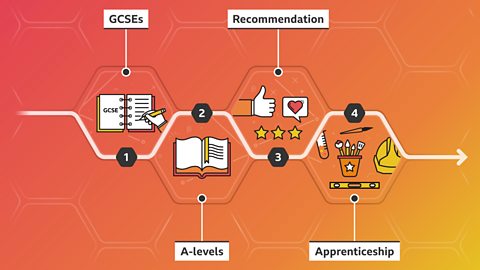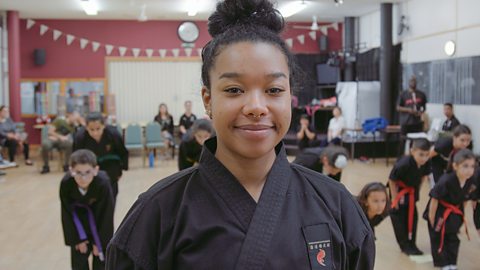Meet Halimah, 21, from Birmingham, and find out more about life as a paralegal apprentice at Pinsent Masons. Part of our Bitesize world of work series.
Hi, I'm Halimah, I'm 21 years old and I'm an apprentice paralegal. I work in the competition law department, which ensures businesses are fair with their prices for customers. I studied Psychology, Sociology, Religious Studies, and Philosophy. It was during sixth form, when I was taking these subjects, that I spoke to a careers advisor about law and made this option realistic for me.
Following my own research at home, I decided that the apprenticeship route was a viable option for me. In order to apply for a legal apprenticeship, I sent my application to various employers who then called me for a group activity exercise. The group exercise consisted of us pitching an idea for a business and testing our communication skills. Following this, I was taken to the interview stage where I was interviewed about my legal apprenticeship.
The apprenticeship programme is two years long with a qualification at the end of the process. Every Monday, we study at university towards our qualification and the rest of the week is spent in the office working. Being an apprentice paralegal in my department consists of undertaking legal research, managing files, and doing essential administration work.
Halimah's got great attention to detail. Every piece of work that she checks is always fantastic. She also has fantastic legal research skills and so that makes sure that all of our work going out to clients is absolutely correct and accurate, which is obviously very helpful for us.
Upon completion of my apprenticeship, I will qualify as a paralegal within the firm. I then intend to undertakefurther studies to become a solicitor. I want to practise as a solicitor because I believe that the law ensures fairness for everyone.
I want to practise as a solicitor as I believe that law ensures fairness for everyone.
- Halimah studied Psychology, Sociology, Religious Studies and Philosophy at A-level and thought she would continue on to university
- She spoke to a careers advisor at school where she discovered legal apprenticeships. She applied for a paralegal apprenticeship scheme at Pinsent Masons, a commercial law firm, which would allow her to earn a salary whilst learning and gain experience
- Paralegals carry out a range of legal work: research, preparation of legal documents and legal advice to clients
- Halimah's role requires good attention to detail and research skills. Her ambition is to qualify as a paralegal, then as a solicitor.



What to expect if you want to be a paralegal
- Paralegal average salary: ÂŁ15,550 to ÂŁ40,000 per year
- Paralegal typical working hours: 37 to 40 hours per week
What qualifications do you need to be a paralegal?
You could get into this role via a university course or a degree apprenticeship. There's a lot of competition for places on law degrees, so you'll need good grades in your entry qualifications. You'll usually need one or two A-levels, or equivalent, for a foundation degree or higher national diploma and two to three A-levels, or equivalent, for a degree. Alternatively, you could to a T-level in Legal Services (England only, from Sept 2023). A T-level is equivalent to three A-levels. You can also do a college course such as a Level 2 or 3 Diploma or a Level 2 certificate. You could also take a paralegal advanced apprenticeship. This typically takes 24 months to complete as a mix of workplace learning and study. Employers will set their own entry requirements, so do check before applying. You can also work towards the role by finding work with a legal practice as an admin assistant and do training on the job to qualify. This could be done through the Institute of Paralegals or the National Association of Licenced Paralegals. You'll be expected to have GCSEs or A-levels and a good standard of English.
Sources: LMI for All, National Careers Service, .
This information is a guide and is constantly changing. Please check the for the latest information and all the qualifications needed and the for more on T-levels.
Find out more on the Prospects website about the role of a .
For careers advice in all parts of the UK visit: , , and .


Find out more
Find work experience placements with Workfinder.
Tips and advice
Help with interviews, writing a CV and all things work experience related.


Khadija: first aider
Khadija uses her medical knowledge to teach young people first aid.

Shola: trainee karate instructor. video
Shola uses her knowledge of the body in her role as a trainee karate instructor.

Lucy: vet
Lucy uses her knowledge of Biology in her job as a vet.
